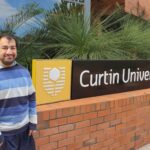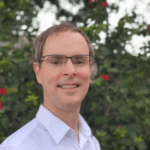Fourteen international relations students landed in Timor-Leste for a whirlwind, two week study tour last November, taking their classroom learning to poverty-stricken villages, charities and international embassies, and learning the art of diplomacy along the way.
It is the second time Curtin has led such a tour, which has proved to be a success for students and Timorese communities alike. Curtin is the first university in Australia to undertake a tour of this kind in Timor-Leste with the United Nations.
“The purpose of the tour was to ensure our students could experience field work that relates to what is taught in the classroom,” says trip leader and Curtin international relations lecturer, Chris Ryan.
“When working in international relations, or as a diplomat, you need to know what’s going on [down] on the ground – not just from your experience of learning in the classroom. It’s also critical for students to understand the geopolitical space in which they will be operating, particularly in a developing space [like Timor-Leste] that is in Australia’s scope and interest,” Ryan adds.
Occupying half the island of Timor in Southeast Asia, Timor-Leste went through a period of political unrest as it came under Indonesian occupation from 1975 to 1999. In 2002, Timor-Leste became the first new sovereign state of the 21st century. According to Oxfam Australia, Timor-Leste has a population of 1.24 million people, of whom 41 per cent live in extreme poverty and almost 29.5 per cent have no access to safe water.
Fellow trip leader Gavin Briggs, who also lectures in international relations at Curtin, says the students learned a lot by meeting the local Timorese communities and immersing themselves in their history and culture.
“Visiting some of the sites where the Timorese people had suffered in their long, hard-fought journey to independence, such as the Santa Cruz Cemetery, Liquiçá Church and the Resistencia Museum, were all particularly moving experiences,” says Briggs.

The students agreed, the memorable experiences bringing true meaning to their studies.
“The trip offered exposure – exposure to the real world, to the reality of working in a post-conflict and developing country,” says study tour student Rachael Champtaloup.
As part of the tour, the students delivered a Water, Sanitation and Hygiene (WASH) program to primary schools, which educates children on the importance of hygiene practices, such as hand-washing. The students expanded on the 2015 program by sending sewing machines to a local community in the capital city Dili, which enabled people to make and sell female hygiene packs, with the profits returned to the community.

The students also helped deliver water tanks to poverty-stricken villages through Ryan’s non-government organisation, Every Single Drop.
“Timorese children continue to die from water-borne diseases and the work done through the study tour and Every Single Drop goes a long way to addressing this critical issue,” says Ryan.
“Water tanks not only capture water, they keep the water in times of drought and when there’s a lack of water in general. This means communities can begin to make provisions to plant crops for their village and address food security issues.”
In addition to their aid work, students attended a parliamentary session hosted by the President of the Parliament and the US Embassy, and had the opportunity to ask questions about climate change mitigation and policy, as well as other critical environmental factors significantly affecting the livelihood of Timorese people.
For student Laurelle Neugebauer, the experience gave a powerful insight into how she can make a positive impact on communities and their environments by continuing her work in international relations.

“I would like to first help the people meet their basic needs, and then evolve towards more sustainable and environmentally friendly innovative technologies,” she says.
For student Jack Eaton, the tour has reaffirmed his decision to study international relations.
“The Timor-Leste trip was reminder that there are people working on the ground implementing programs that are having a real impact,” he says. “ The tour has provided an invaluable practical component to my degree that a student can’t experience in the classroom. I would highly recommend this trip to any student who is serious about a career in the field of international relations.”



